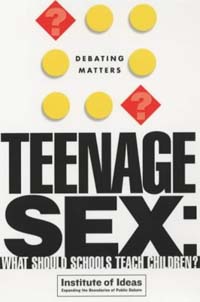
|
Jailing of Teen Lovers Gay/Straight
 London, United Kingdom-- The Sexual Offences Bill came before the British House of Commons Standing Committee yesterday. London, United Kingdom-- The Sexual Offences Bill came before the British House of Commons Standing Committee yesterday.
"This Bill is one of the gravest attacks on the sexual human rights of young people for 50 years. It is child abuse masquerading as child protection", said gay human rights campaigner Peter Tatchell and a contributor to Teenage Sex: What Should Schools Teach Children? (Hodder & Stoughton, London) Mr. Tatchell has written to all 19 MPs on the Standing Committee, urging them to amend the Bill to "decriminalize sex involving the under-16s where both partners consent and where there is no more than three years difference in their ages". "This amendment would strike a balance between sexual rights and sexual protection", said Mr. Tatchell. Peter Tatchell 's Letter to MPs: To all members of Standing Committee B on the Sexual Offences Bill 2003 5 September 2003 Dear ............MP, Sexual Offences Bill 2003 - Standing Committee B There follows a critique of the Sexual Offences Bill 2003, which you will be considering in Standing Committee B from 9 September; together with a proposed amendment for your consideration. Although purporting to be a child protection measure, this Bill is a grave attack on the sexual human rights of young people. It explicitly criminalizes even the most innocent and trivial sexual contact between under 16-year olds of the same or similar ages. I would urge you to propose an amendment to decriminalize sex involving the under-16s where both partners consent and where there is no more than three years difference in their ages. Such an amendment would strike a balance between sexual rights and sexual protection. Please advise me of your decision. Thank you.
Yours with appreciation, Sexual Offences Bill - A Critique By Peter Tatchell
This repressive Puritanism is bad enough. But it is about to get much worse. The Sexual Offences Bill (SOB) creates the specific new crime of "child sex offences committed by children or young persons" under the age of 18 with partners under 16. Fifteen-year olds who kiss and fondle each other behind the bike sheds will, under Clause 14, face a maximum sentence of five years imprisonment. Two 12-year old child sweethearts who do the same thing will be committing an even graver offence. According to Clause 8, the most trivial and innocent sexual contact with a person under 13 is punishable by up to 14 years jail. If both partners are under 13 they will not be exempt from potential prosecution. Clause 8 classifies them as major sex criminals, on a par with a 60-year old abuser. Under the SOB, "touching" anyone less than 16 years old will become an explicit crime if "the touching is sexual". "Sexual" is defined as any activity a reasonable person considers "may" be sexual. Mutual consent, analogous ages and tender caresses within the context of a long-term, loving teenage relationship will be no defense. With regard to sexual behavior between people just under and just over the age of consent, a small age difference between partners will be equally criminal as a large one, and sexy cuddles are lumped together with penetrative sex. Any dalliance with a 15-year old - whether kissing or intercourse, and whether the perpetrator is 18 or 48 - will risk the same top penalty of 14 years. The SOB treats a three-year age difference the same as an age gap of 33 years. The Family Planning Association has condemned the legislation for its blanket criminalization of all consenting sexual activity involving the under-16s. It fails to distinguish between abusive relations and desired sexual behavior, according the FPA's chief executive, Anne Weyman.
Even if the SOB is rarely enforced, it will - like Section 28 - create a repressive legal framework that could be exploited by morality campaigners like Brian Souter and Victoria Gillick. A private prosecution may not succeed, but it could provoke fear and anxiety among the under-16s, and inhibit their guardians, teachers, counselors and advice givers. The SOB is the latest example of how a justified concern about child sex abuse has given way to a moral panic concerning teenage sexuality. A century after Freud revealed the reality of young people's sexual desires, the Home Office is in deep denial. The SOB is premised on the assumption that sex is nasty and bad, that all under-age sex is abusive and damaging, and that the pre-16s have no sexual feelings and no ability to make wise, responsible decisions. This head-in-the-sand attitude ignores the facts. Young people typically reach puberty between the ages of eight to 11. That is when their hormones switch on and they develop a natural curiosity about each other's bodies and sex. This sexual exploration and experimentation is a spontaneous, innocent part of growing up. The government believes it should be a crime. The National Survey of Sexual Attitudes & Lifestyles (1994) found the median age of first sexual experience among 16-24 year olds was 14 for girls and 13 for boys (sexual experience includes everything from kissing to caressing, mutual masturbation, oral sex and intercourse). A survey in 2000 for the Channel 4 television program, Sex from 8 to 18, revealed the average age of first intercourse is now 15. The SOB says all these young people are criminals. Hell-bent on repressing their sexuality, it denies them the right to sexual pleasure and rejects the idea that they have sexual human rights. The Home Office justifies its stance in the name of child protection, claiming it is impossible to draft legislation to distinguish between consensual under-age sex involving people of comparable ages and abusive relations perpetrated by much older adults. This is not true. The SOB could be easily amended to decriminalize sex involving the under-16s where both partners consent and where there is no more than three years difference in their ages. Mutually agreed sex would, for example, be lawful between a 13-year and a 14-year old, but not between partners aged 13 and 30. This amendment would strike a balance between rights and protection. Similar clauses already exist in the German, Israeli and Swiss age of consent laws. If there, why not here? |
|
 British activist Peter Tatchell
British activist Peter Tatchell  Peter Tatchell was contributor to Teenage Sex: What Should Schools Teach Children?
Peter Tatchell was contributor to Teenage Sex: What Should Schools Teach Children?